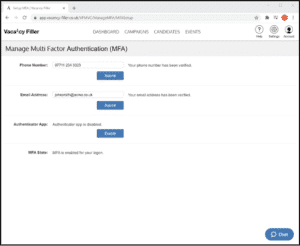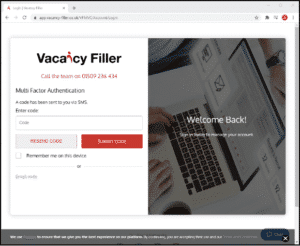
Remote working has seen a rise in security risks with HR teams accessing candidate confidential data outside of the office network.
But why should you consider Multi-Factor Authentication for Applicant Tracking System users and what are the benefits?

What is Multi-Factor Authentication?
Multi-Factor Authentication is the process of locking company data (candidate data) until users have successfully presented two pieces of evidence (or factors). Multi-Factor Authentication seriously reduces the risk of unauthorised access and system breaches to your Applicant Tracking System and more importantly, to your candidate data, and no HR team or business wants that!

Is Multi-Factor Authentication complicated?
No, it shouldn’t be, as long as your Applicant Tracking System provider offers it! Once configured, all that happens is when your Applicant Tracking System users sign in they will be asked to enter a security code – which is delivered via either SMS, Email, or an Authentication App (such as Google Authenticator). This code has a very short lifespan by the way! Once this code is activated, the user is authenticated and given permission to access the platform.
Here’s an example of a Multi-Factor Authentication Set-up Screen on which a user will be able to determine their preferred method to receive their authentication code:

Once complete, the user will receive the Authentication code via their preferred method and can then access the system, but more securely, here’s an example of a log-in screen with Multi-Factor Authentication activated in the business. Plus, by checking the “remember me on this device” option, users do not have to repeat this authentication until the number of days – set by the organisation (based on their security requirements).

What are the benefits of Multi-Factor Authentication?
- It protects the user’s credentials and provides a higher level of access compared to authentication methods that rely only on a password.
- A higher level of security makes it harder for attackers to gain access to a person’s devices or online accounts.
- It’s harder for hackers to access candidate data within an Applicant Tracking System, which stores personal information.
- It protects from data breaches meaning you uphold your business reputation.
- It Increases the ability to comply with GDPR.
- Users can access the system anywhere so long as they have access to their mobile and email accounts.

Don’t be afraid to implement Multi-Factor Authentication, it represents improved security and increased compliance for your HR function.
Applicant Tracking Systems are advancing at speed, so we’ve put together this handy guide if you are currently reviewing an Applicant Tracking System. Alternatively, reach out to one of our recruitment experts to see how HireRoad can support your recruitment strategy by booking a demo below or calling us at 01509 236 434.
